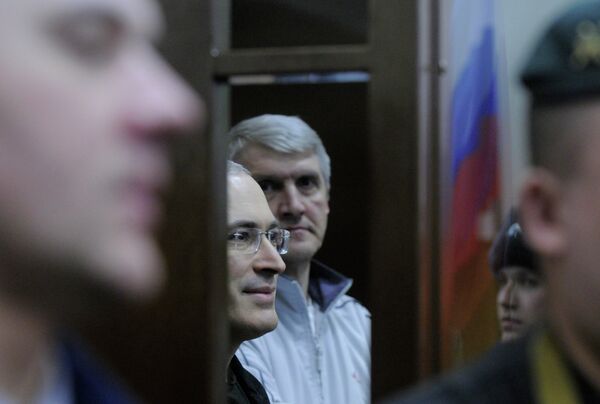Suggestions made by some European Parliament members in the case of Russian ex-oil tycoon Mikhail Khodorkovsky and his business partner Platon Lebedev are an attempt to put pressure on Russia, Russia's ruling party leader Boris Gryzlov said.
Members of the European Parliament led by Estonian Group of the Alliance of Liberals and Democrats for Europe deputy Kristiina Ojuland moved to impose economic sanctions and travel restrictions on Russian officials involved in ex-oil tycoon Mikhail Khodorkovsky's trial and conviction.
If the European Parliament's deputies representing the Commission on Human Rights, disturb the situation now... imposing on them (Russian officials involved in the sentencing of Khodorkovsky) some sanctions, including denial of visas to the EU countries, then they are in a haste," Gryzlov, who is also speaker of the lower house of parliament, the State Duma said on air of Vesti on Saturday TV program.
"If they [MEP] talk about that knowing that this [the sentence] has not come into force, then that is not a fight for human rights that is a political innuendo, an attempt to put pressure on Russia before the sentence comes into force," Gryzlov said. "This is a false start, this plays them off totally," he continued.
In late December, Moscow's Khamovniki District Court sentenced Khodorkovsky and his business partner Platon Lebedev to a total of 14 years in prison in a second trial involving Yukos assets. The two men, who already spent seven years in jail for fraud and tax evasion from their 2005 trial, could remain behind bars until 2017.
Once Russia's richest man, Khodorkovsky was found guilty of stealing 218 million tons of oil from his own company and laundering the proceeds, worth around $100 million.
Khodorkovsky and Lebedev have repeatedly denied the charges, saying they were politically motivated.
Ojuland's press secretary, Joel Hirv, said sanctions remain the only possible way to make Russian authorities obey laws, as the European Parliament representatives along with other European institutions have tried hard to convince their Russian colleagues to do so without apparent results.
Earlier Ojuland backed sanctions against Russian officials allegedly involved in the death of corporate lawyer Sergei Magnitsky in a detention center in Moscow. Her proposal for sanctions against Russian officials in Khodorkovsky's case was strongly supported by her European colleagues.
Many Western countries and organizations, including the United States and the European Union, have condemned the verdict as harsh and unfair, and expressed concern over the fact that the judicial system in Russia has shown no signs of improvement despite President Dmitry Medvedev's pledge to make it just and transparent.
Khodorkovsky and Lebedev's lawyers have already appealed the verdict.
VLADIVOSTOK, January 15 (RIA Novosti)


